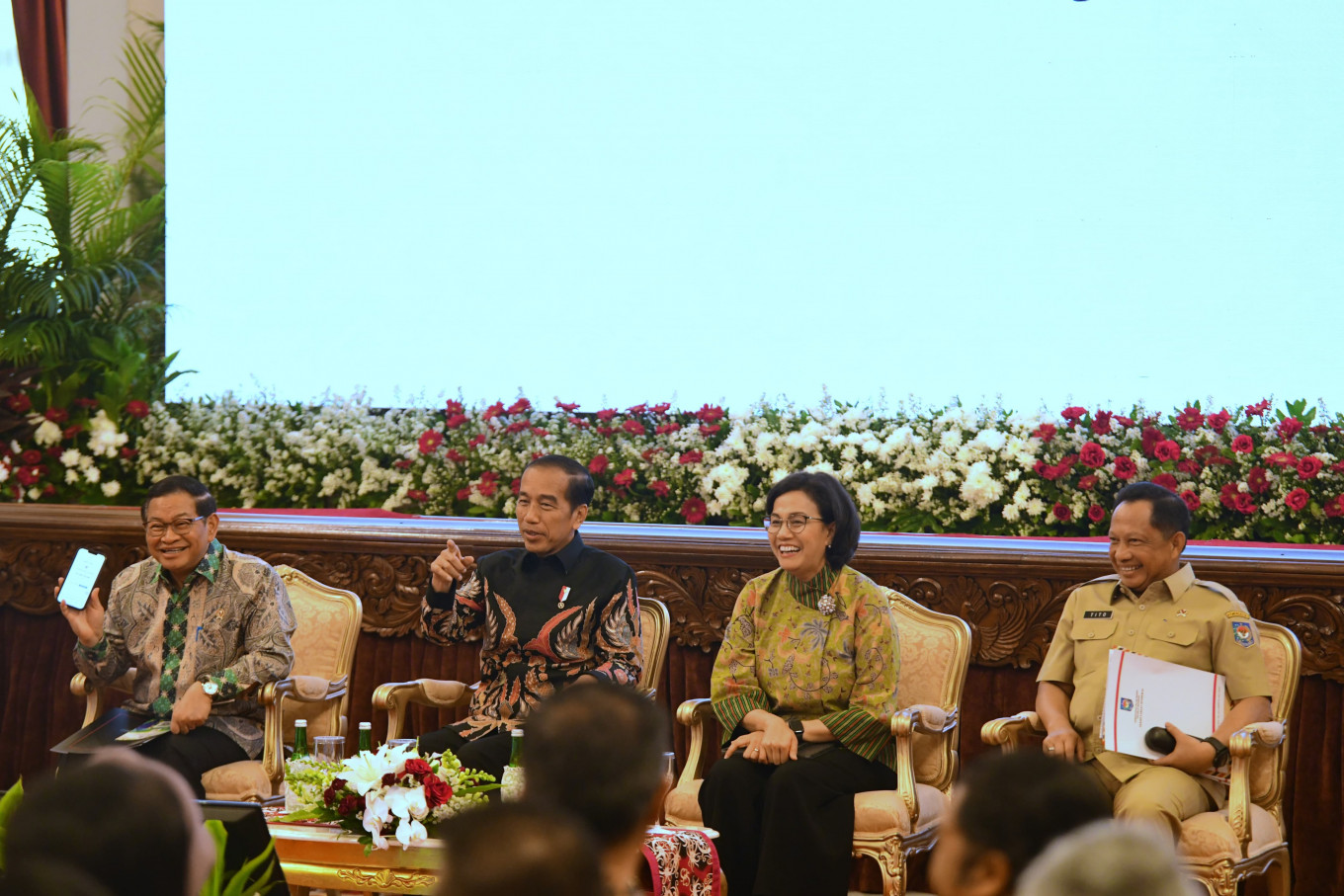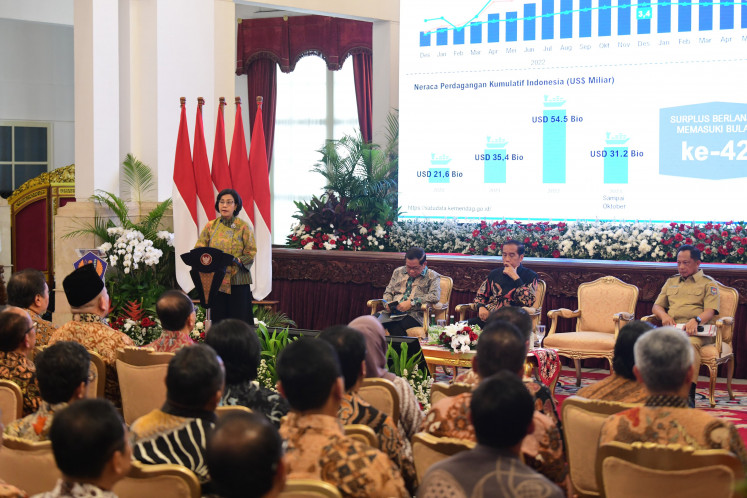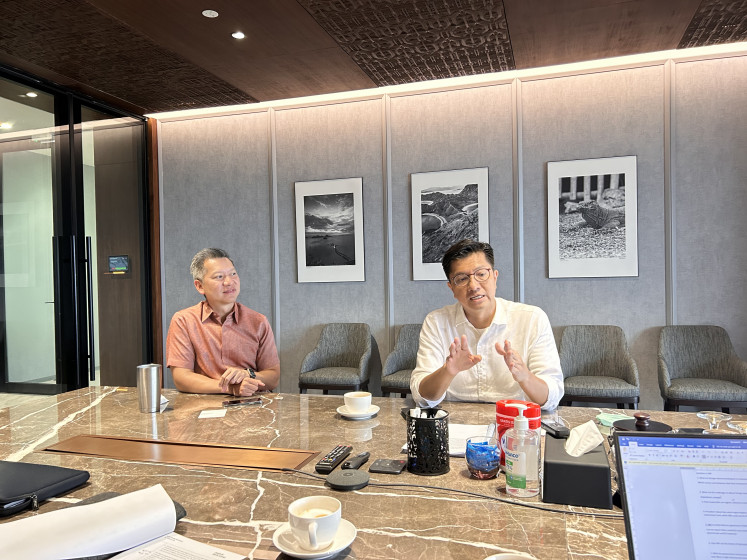Popular Reads
Top Results
Can't find what you're looking for?
View all search resultsPopular Reads
Top Results
Can't find what you're looking for?
View all search resultsDigitalization of the 2024 state budget DIPA and TKD meant to simplify the budget process
Change text size
Gift Premium Articles
to Anyone
F
inance Minister Sri Mulyani Indrawati accompanied President Joko “Jokowi” Widodo at the Budget Implementation List (DIPA) handover event at the State Palace in Jakarta on Wednesday.
As an event that digitally delivers the DIPA to regional heads and heads of state ministries and agencies, this handover is crucial as the involved documents are imperative to the state budget. Ministers/agency leaders use these documents as references alongside regional heads to collaboratively implement various development programs that enhance societal well-being across the country and in drafting the state budget.
The entire process of preparing and approving the 2024 state budget was relatively smooth and timely amid an improving economic situation, thanks in large part to the support of various parties, especially the legislative branch.
"The state budget is crafted optimally to fulfill all priority programs for national development, including protecting the general public and vulnerable groups, economic recovery, driving transformation, developing regions and enhancing defense and security. This effort is carried out while maintaining the health, sustainability and credibility of the state budget. Thus, fiscal policy in the state budget can continue to be beneficial, effective in maintaining the economy and successful in safeguarding the Indonesian people," said Finance Minister Sri Mulyani.
Moreover, the Finance Ministry introduced a breakthrough in the form of budget document digitalization during the event, seen as an efficiency improvement that supports the Green Office initiative by reducing paper usage and expediting administrative processes.
"We want to report that the DIPA handover is different from previous years because, for the 2024 state budget, it was done through digital processes. Starting from budget approval to the DIPA signing process, all of it is done electronically," said Sri Mulyani during her presentation at the State Palace.
"Previously, there were 12 complicated stages in the budget approval process, and now there are just four, all using the SAKTI application. The electronic signature on DIPA will also be immediately certified,” she added.
In her presentation, Sri Mulyani noted that the allocated funds for the 2024 state budget were Rp 3,325.1 trillion.
This budget is intended for various government priorities, which include the completion of priority infrastructure projects, acceleration of green economic transformation, supporting bureaucracy and civil servant reforms and the strengthening of national defense.
"The central government's expenditures will be directed toward improving human resource quality, consuming a significant portion of the state budget allocation. Government spending will also support the implementation of elections and provide further assistance for regional elections. Priority government spending will also strengthen Indonesia's resilience and security, especially for teachers and health workers," Sri Mulyani stated.
“Government spending will also be utilized to increase public services in rural areas, support the operations of national schools, the education of our children, increase education equality and also mitigate the issue of extreme poverty and stunting,” she continued.
Sri Mulyani also highlighted the country’s success in overcoming the COVID-19 pandemic, navigating successfully through challenges. Despite global economic fluctuations, Indonesia has managed to achieve 5 percent annualized economic growth for eight consecutive quarters, with the government believing that Indonesia's GDP growth will remain stable at above 5 percent by the end of 2023.
Previously, she hoped that for the entirety of 2023 the Indonesian economy would remain above 5 percent growth, specifically 5.04 percent.
“We hope that our economy will remain stable at 5.04 percent, because if not, with a third quarter averaging at 4.94 percent and a fourth quarter lacking meaningful support, our economic growth could fall to around 4.99 percent in 2023” Sri Mulyani added
She also revealed that the 2024 state budget deficit was expected to be 2.29 percent of GDP, or around Rp 522.8 billion. She affirmed that she was committed to preserving this state budget deficit value amid world conditions, including higher-for-longer reference interest rates in various countries in regard to the rupiah exchange rate.
"We will use the government's cash buffer to minimize financing risks and maintain the debt ratio at a safe level," said Sri Mulyani.
Results-oriented state budget
During the event, President Jokowi cautioned about global uncertainty and potential crises and recessions, urging local and ministry leaders to manage budgets with discipline, precision and targeted efficiency.
"The current geopolitical climate is not getting better, rather it is getting hotter. We can feel the impact of climate change more and more clearly. And the potential crisis and potential recession are not easing but are also getting stronger," said the President.
He also said he hoped that regional and ministry heads would manage the budget in a disciplined, thorough and targeted manner.
"Prioritize transparency and accountability. Do not leave any room for budget misuse related to corruption. Close it!" emphasized the President.
Regarding execution, Jokowi emphasized the need for immediate action to avoid the same problem of accumulated realizations at the end of each year. He urged swift execution, especially considering the limited time left.
“Execute immediately. Perhaps I’ve been repeating this over and over, but January is drawing close, and we need to achieve realization as soon as possible. Earlier I asked the Home Ministry for information on how much realization has been achieved. So far it's only 64 percent in the rural regions, while the center is still at only 74 percent. We only have three weeks left," he explained.
Jokowi also stressed the importance of anticipating uncertainty through automatic adjustments to make the state budget more flexible.
"As soon as there is a change, be agile in adapting, as this uncertainty truly looms every day, week and month. And remember, this is the people's money, so focus on results. The orientation is on results," stated Jokowi.
Most importantly, the President emphasized maximizing the budget for the benefit of the people. He urged local governments to strengthen synergy and policy harmony with the central government, ensuring that the regional budgets align with development plans.
"Collaboration and harmony are crucial. If the central government builds a dam and irrigation, and the regional tasks are not completed, what's the use? If a big port is built, but the provincial-district/city roads are not connected, what's the use? If a toll road is constructed, it should be connected to industrial areas, tourism, and plantations, not neglected. This needs to be emphasized, synergy and harmony," added Jokowi.
Furthermore, Jokowi highlighted the current global economic challenges and prospects and their uncertainty. He stressed the need to optimize the budget in 2024, complete unfinished portions of the development agenda and strengthen the foundation for the future government.
"Utilize local transfer funds for improving public services, education, health, infrastructure, and develop alternative financing innovations," concluded the President.
(Courtesy of Finance Ministry)Key points of the 2024 state budget
The 2024 state budget will be used as an instrument to ward off challenges and threats to stability. Therefore, it is designed to be anticipatory, alert to potential crises, responsive, prioritize community and national interests and support economic growth. The state budget must also be able to protect society, especially the poor and vulnerable in the form of social protection so that Indonesia can reduce poverty, including extreme poverty, which is targeted to be close to 0 percent by 2024. Apart from that, other welfare targets must also be achieved in 2024, such as reducing unemployment to between 5.0 percent and 5.7 percent, reducing the Gini ratio to between 0.374 and 0.377 and increasing the Human Development Index to between 73.99 and 74.02.
The 2024 state budget is designed to accelerate economic transformation, so its role needs to be optimized to: (i) ensure the state budget acts as a shock absorber, protecting the people and stabilizing the economy from global shocks (stabilizing food prices, energy security and controlling inflation); (ii) have the state budget function as a development agent (economic transformation accelerator) that focuses on human capital, physical capital, natural capital and institutional reform; and (iii) ensure the state budget is an instrument for advancing public welfare (reducing extreme poverty, stunting and inequality).
The state revenue target is Rp 2,802.3 trillion, which will be achieved through, among other things, expanding the tax base as a follow-up to the HPP Law through a follow-up to PPS and the implementation of the NIK as NPWP. The government will also optimize excise revenue, which will be achieved, among other ways, through excise intensification and extensification in order to support the implementation of the HPP Law.
Aside from that, more optimal use of Indonesia’s natural resources will be made, and added value will be increased while still paying close attention to environmental sustainability through steps such as refining policies and improving natural resource management.
State expenditure in 2023 is set at Rp 3,325.1 trillion, consisting of central government expenditure of Rp 2,467.5 trillion and transfers to rural regions set at Rp 857.6 trillion. State spending is directed at supporting the acceleration of economic transformation through eliminating extreme poverty, reducing stunting, controlling inflation, increasing investment, strengthening the quality of human resources, accelerating infrastructure development, supporting the downstreaming of natural resources, deregulation and strengthening institutions. The government will strengthen spending further by encouraging efficiency in basic needs, focusing on development priorities and promoting a results-based budget execution. Subsidy and social development programs will be pushed to be more targeted and effective through increasing data accuracy, improving distribution mechanisms and program synergy.
Moreover, the synergy and harmonization of central and regional policies with be strengthened, including through the implementation of the macroeconomic framework and the main points of regional fiscal policy and strengthening the efficiency and effectiveness of state spending (spending better), which is not only directed at encouraging economic growth but also at encouraging equitable development, job creation, poverty alleviation and reducing disparities both between groups and between regions.
The 2024 state budget has been designed with a deficit of Rp 522.8 trillion, with a focus on budget financing policies in order to cover the deficit, which is carried out through measures that maintain debt financing within safe and manageable limits as well as optimizing non-debt financing. In more detail, the budget financing policy in the 2024 state budget includes, among other things, a debt financing policy that is directed so that: (i) debt management is carried out prudently and flexibly; (ii) debt cost efficiency is ensured through financial market development and deepening; and (iii) selective debt loans are used in order to encourage infrastructure provision and technology transfer.
Lastly, non-debt financing policies are carried out through effective investment financing in supporting economic transformation through empowering BLU, BUMN, SMV and SWF.
The utilization of excess funds (SAL) will also be optimized to anticipate uncertainty. The government will aim to maintain solid collaboration between fiscal, monetary and financial sector policies. By paying attention to the direction and strategy of fiscal policy in 2024, which is designed to encourage structural reform in the context of accelerating inclusive and sustainable economic transformation while still paying attention to innovative, prudent and sustainable budget financing, the budget deficit is estimated to be at 2.29 percent of GDP or lower than the 2023 outlook. Apart from that, the primary balance can also be maintained toward positivity.
"We hope that the DIPA of ministries/institutions and the List of TKD allocations in 2024 can be followed up immediately, so that the 2024 state budget can be implemented as soon as possible,” Sri Mulyani said to close her report.
Source: The Finance Ministry












